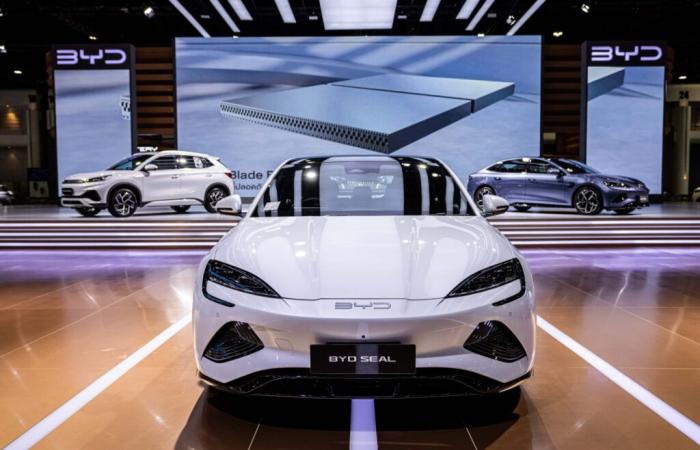Electric car news
The automobile industry is booming. The European Union's recent decision to increase customs duties on Chinese electric cars has sparked a diplomatic and commercial storm. You are probably wondering what the consequences will be for the automobile market and for you, consumers?
The new European taxes that are shaking the Middle Kingdom
On October 29, the European Union officially implemented new customs rates on electric cars imported from China. The move follows an investigation that revealed massive subsidies from the Chinese government to its automakers. The new rates, which are added to the 10% already in force, vary depending on the brand:
- Tesla: 7.8% (for Model 3s produced in Shanghai)
- BYD : 17%
- Geely (Volvo, Polestar, Smart, etc.) : 18,8%
- SAIC (MG) : 35,3%
- Other cooperative brands (Xpeng, Nio): 20.7%
- Non-cooperative brands: 35.3%
These substantial increases aim to rebalance the competition between European and Chinese manufacturers. But they also provoked an immediate and virulent reaction from Beijing.
The Chinese response: a complaint to the WTO and veiled threats
Faced with what it considers to be an unjustified measure, China counterattacked by filing a complaint with the World Trade Organization (WTO). A spokesperson for China's Ministry of Industry said the EU decision “lack of factual and legal basis” and that it constitutes a “abuse of trade remedy measures”.
But China does not intend to stop there. Rumors are circulating about a possible investigation into European imports of pork, dairy products and cognac. A way of putting pressure on the EU by targeting important economic sectors.
In addition, Beijing could complicate the lives of German manufacturers, who are very dependent on the Chinese market. Volkswagen, BMW and Mercedes generate a significant portion of their sales in China, and any retaliatory measures could have disastrous consequences for these automotive giants.
Adaptation strategies of Chinese manufacturers
Faced with these new customs barriers, Chinese manufacturers are not sitting idly by. Several strategies are emerging:
- Relocation: BYD, for example, is currently building a factory in Hungary and is planning another in Türkiye. Other countries such as Morocco could also host Chinese production sites.
- Focus on hybrid: Hybrid and plug-in hybrid cars are not affected by these new taxes. MG and BYD have already started to offer their hybrid models in France, a trend which could increase.
- Technological innovation: Chinese manufacturers could accelerate the development of cutting-edge technologies to justify higher prices on the European market.
Implications for the European automotive industry
While this trade war may seem advantageous for European manufacturers in the short term, it also carries significant risks:
- Dependence on Chinese components: China has a virtual monopoly on many elements essential to the manufacturing of electric cars, notably batteries. Supply problems could arise and paralyze European production.
- Loss of competitiveness: In the absence of Chinese competition, European manufacturers may have less incentive to innovate and reduce costs, which could harm their long-term competitiveness.
- Retaliation on other sectors: If China decides to retaliate by targeting other European industries, the overall economic impact could be significant.
What consequences for you, consumers?
For you who are considering purchasing an electric car, this situation could have several implications:
- An increase in prices: Chinese models, hitherto known for their good value for money, risk becoming less affordable. This increase could also be reflected on European models, with manufacturers taking advantage of the reduction in competition.
- A more restricted choice: Some Chinese manufacturers could decide to withdraw from the European market in the face of these new constraints, thus reducing the available supply.
- A slowdown in innovation: Chinese competition has pushed European manufacturers to innovate quickly. Its weakening could slow the pace of technological advances.
- A slower ecological transition: If electric cars become more expensive overall, this could slow down their adoption and, therefore, slow down the transition to greener mobility.
Towards a redefinition of the global automobile market
This trade war between Europe and China marks a turning point in the global automobile industry. It underlines the strategic importance of the electric car sector and the desire of the major powers to dominate this market of the future.
For Europe, the challenge is significant: protecting its industry while remaining competitive and innovative. For China, it is a question of maintaining its dominant position in a sector that it has largely contributed to developing.
In this tense context, you, consumers, will have to remain attentive to market developments. The next few months will be crucial and could well reshape the automotive landscape that you know. One thing is certain: the road to the electric mobility of the future promises to be more winding than expected.
Written by François Zhang-Ming
I have always shown a keen interest in science and technology from a very young age. I have a dual culture, Chinese through my mother and French through my father but also through my studies, which allows me to be very familiar with the technological innovations of the Far East.
React to the article







